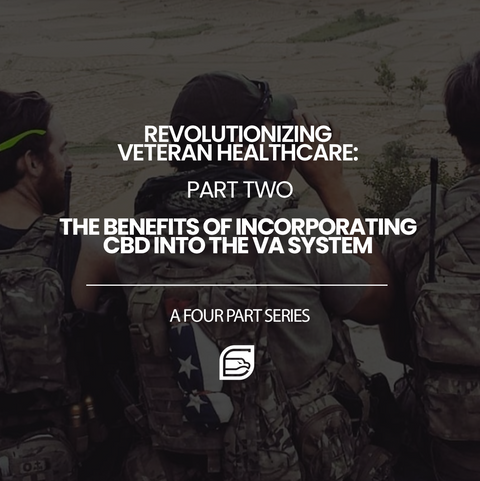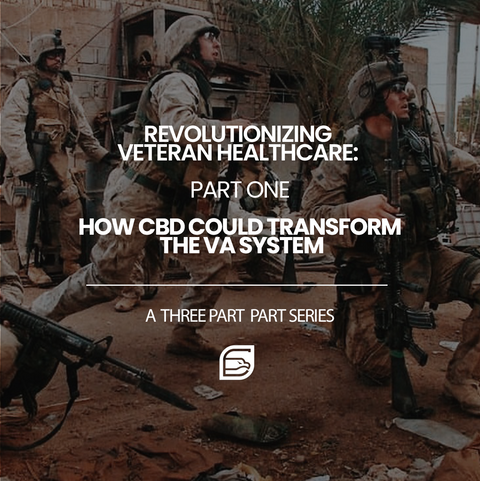As a society, we owe a great debt to our veterans.
The men and women who have served our country have sacrificed so much, and it is our responsibility to provide them with the care and support they need when they return home.
Unfortunately, many veterans suffer from physical and mental health issues that can be difficult to treat with traditional medical methods.
This is where CBD comes in. CBD, or cannabidiol, is a natural compound found in the hemp plant that has been shown to have a wide range of health benefits.
In this post, we will explore the need and benefits of incorporating CBD into the veterans affairs.
The Need for CBD in Veterans Affairs

According to the Department of Veterans Affairs (VA), an average of 17 veterans commit suicide every day.
This staggering statistic is proof that traditional medical methods are not doing enough to address the mental health issues that many veterans face.
PTSD, depression, and anxiety are just a few of the mental health conditions that veterans may experience after serving in combat. In addition to mental health issues, veterans also often suffer from physical injuries, chronic pain, and other conditions that can be difficult to treat with traditional medications.
CBD has been shown to have a positive impact on many of these conditions. For example, a 2019 study published in the Journal of Clinical Psychology found that CBD may be effective in reducing symptoms of PTSD. Another study published in the found that CBD can reduce chronic pain and inflammation.
Despite the promising research, CBD is not currently a part of the standard treatment options offered by the VA.
This means that many veterans are missing out on the potential benefits of this natural compound.
Benefits of Incorporating CBD into Veterans Affairs

PTSD Treatment
As mentioned earlier, CBD has been shown to have a positive impact on PTSD symptoms.
PTSD is a mental health condition that can develop in people who have experienced or witnessed a traumatic event, such as military combat.
Symptoms of PTSD can include flashbacks, nightmares, and anxiety.
Research has shown that CBD may be able to help reduce symptoms of PTSD.
A 2023 study found that CBD was effective in reducing symptoms of PTSD in a group of 5 adults. and significantly reduced PTSD symptoms.
Chronic Pain Management
Chronic pain is a common issue for veterans, especially those who have been injured in combat.
Traditional pain medications (+ NSAIDS) can be addictive and may have negative side effects. CBD, on the other hand, has been shown to be effective in reducing chronic pain without the risk of addiction or other negative side effects.
An article in Medical News Today found that CBD can reduce chronic pain and improve sleep in people with chronic pain conditions.
Anxiety and depression are common mental health conditions that can be difficult to treat with traditional medications.
CBD has been shown to have a positive impact on both anxiety and depression.
A in an article published on Medical News Today, it was found that CBD can reduce anxiety in people with anxiety disorders.
Anxiety disorders are among the most common psychiatric conditions. The National Institute of Mental Health (NIMH) estimates that 19.1% of adults in the U.S. experienced an anxiety disorder in the past year, and more women experience anxiety than men.
In a recent 2020 study researchers evaluated CBD’s effects on 397 adults living in New Zealand. The study participants received medical CBD prescriptions for various ailments, including non-cancer pain, cancer-related symptoms, neurological symptoms, and mental health symptoms.
All groups reported improvements in their overall quality of life after 3 weeks of CBD treatment. The individuals who received CBD treatment for anxiety or depression reportedly experienced improvements in their ability to perform daily functions and reduce pain and anxiety or depression symptoms.
Cost-Effective
CBD is a cost-effective treatment option compared to traditional medications. Traditional medications can be expensive, especially if they need to be taken over a long period of time.
CBD, on the other hand, is a natural compound that can be grown and produced relatively inexpensively.
Incorporating CBD into the treatment options offered by the VA could help to reduce healthcare costs for the VA, as well as provide a cost-effective treatment option for veterans.
The Bottom Line
Incorporating CBD into the treatment options offered by the VA has the potential to provide a wide range of benefits for veterans.
CBD has been shown to be effective in reducing symptoms of PTSD, chronic pain, anxiety, and depression.
It may also help to reduce the risk of substance abuse and addiction, protect the brain from damage caused by trauma or injury, and provide a cost-effective treatment option.
Despite the promising research, CBD is not currently a part of the standard treatment options offered by the VA.
It is important for the VA to consider incorporating CBD into their treatment options in order to provide veterans with the care and support they need.
As a society, we owe a great debt to our veterans.
Incorporating CBD into the treatment options offered by the VA is one small way we can repay them for their service and sacrifice.
It is our responsibility to ensure that veterans have access to the best possible care and treatment options, and CBD has the potential to provide a wide range of benefits for those who have served our country.







Comments (0)
There are no comments for this article. Be the first one to leave a message!